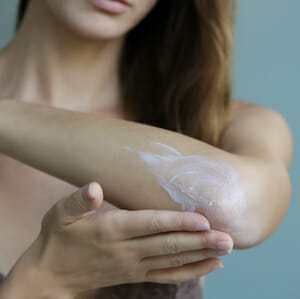Why Is My Skin So Dry, Even When I Moisturize?
- Posted on: Feb 8 2022
 Are you moisturizing every day, but your skin still feels dry and dehydrated? As frustrating as this may be, it’s a very common skin concern. Learn about the most likely reasons why you’re experiencing dry, flaky skin and what you can do to achieve healthier, hydrated skin.
Are you moisturizing every day, but your skin still feels dry and dehydrated? As frustrating as this may be, it’s a very common skin concern. Learn about the most likely reasons why you’re experiencing dry, flaky skin and what you can do to achieve healthier, hydrated skin.
Signs You Have Dry Skin
Dry skin can affect everyone differently. If you have dry skin, you might notice one or more of these symptoms:
• Skin that feels tight
• Itchy skin
• Peeling or flaking skin
• Skin that feels rough
• Redness
• Cracking skin that may bleed
Why Is My Skin So Dry, Even When I Moisturize?
It’s frustrating to have dry and flaky, especially when you continue to moisturize. Dry skin can happen to anyone, but there are several common causes and risk factors that can increase your chances of developing dry skin:
Using Harsh Cleansers
Using cleansers that contain harsh ingredients removes natural oils and promotes dry skin. If your skin ever feels dry, tight, or sensitive after cleansing, you’re probably using the wrong cleanser. Avoid cleansers with sulfates or isopropyl alcohols and choose an oil-based or cream cleanser instead.
Frequent Washing
Frequent washing, seen often in this era of COVID-19, can also strip the natural oils from your skin. Be sure to follow up each hand washing with an application of a moisturizer that is designed for your skin type.
Using the Wrong Moisturizer for Your Skin Type
When considering products to add to your daily routine, always choose products that are specially formulated for your skin type. Thicker moisturizing creams that provide your skin with a burst of hydration are ideal for dry skin but may not be ideal for those with normal to oily skin. To improve dry skin, look for moisturizers containing hydrating and soothing ingredients like hyaluronic acid, ceramides, glycerin, and fatty acids.
Living in a Cold, Dry Climate
The cold, dry weather during winter in Colorado can cause skin dryness and irritation. The combination of low humidity levels and cold temperatures in the winter months dehydrates your skin by drawing moisture away from it, resulting in dry, itchy skin.
Age
As we age, our skin loses the ability to retain moisture. The production of sebum, a protective oil that seals in moisture and keeps your skin soft, starts to diminish by your 40s.
Certain Medications
Side effects of over-the-counter and prescription medications can cause dry skin. This includes acne treatments, cholesterol medications, antihistamines, and medications that lower blood pressure.
Other Skin Conditions
Many skin conditions, such as psoriasis, eczema, allergic contact dermatitis, irritant contact dermatitis, and dandruff can lead to very dry skin. Certain medical conditions, such as diabetes, kidney disease, and thyroid disease can also contribute to dry skin. Working with a dermatologist can help you successfully treat these underlying causes of skin dryness.
How Can I Improve Dry Skin?
Self-care plays an important role in healing dry skin and preventing its return. Here’s what you can do at home to heal your dry skin:
• Use moisturizer several times a day, especially after showering or bathing and washing your hands.
• Apply your moisturizer when the skin is still damp to trap existing moisture into your skin.
• Limit showers and baths to 10 minutes or less.
• Avoid using hot water when cleansing your skin.
• Avoid using harsh cleansers that strip your skin of vital moisture.
• Drink plenty of water.
• Use a humidifier to add moisture to the air.
• Protect your skin from the cold by wearing gloves, hats, and scarves when outdoors.
Choosing the Right Moisturizer
Since there are so many different moisturizers available, it can be hard to choose one that works best for your skin. All skin types can benefit from a moisturizer, even if you have oily or acne-prone skin.
If you have sensitive skin, look for a hypoallergenic, fragrance-free moisturizer. For oily or acne-prone skin, seek out a lightweight, oil-free moisturizer that’s non-comedogenic. Drier skin will benefit from a thicker, richer moisturizing cream. A lighter moisturizer that’s gel or water-based is suitable for normal and combination skin. Moisturizers containing hyaluronic acid, glycerin, and dimethicone work well with all skin types.
Best Skincare Routine for Dry Skin
Our Asarch dermatologists recommend this simple five-step regimen to protect and hydrate dry skin:
1. Cleanse your skin with a gentle, hydrating cleanser.
2. Use an alcohol-free toner to soothe skin and remove impurities.
3. Appy a hydrating serum containing hyaluronic acid, a humectant that helps keep your skin moist.
4. Lock in moisture with a hydrating cream or lotion.
5. Protect your skin from the sun with a broad-spectrum sunscreen, with an SPF of 30 or higher.
For dry skin on the body, use a fragrance-free cleanser and apply a hydrating cream while your skin is still damp.
When Should I See a Dermatologist About Skin Dryness?
If dry skin persists even after making changes to your lifestyle and applying hydrating creams, schedule an appointment at Asarch Dermatology. Our dermatologists can examine your skin and recommend specific products that can help hydrate your skin and reduce your discomfort. Contact us today to make an appointment at one of our three convenient locations in Englewood, Castle Rock, or Lakewood, CO.
Posted in: Skin Care
